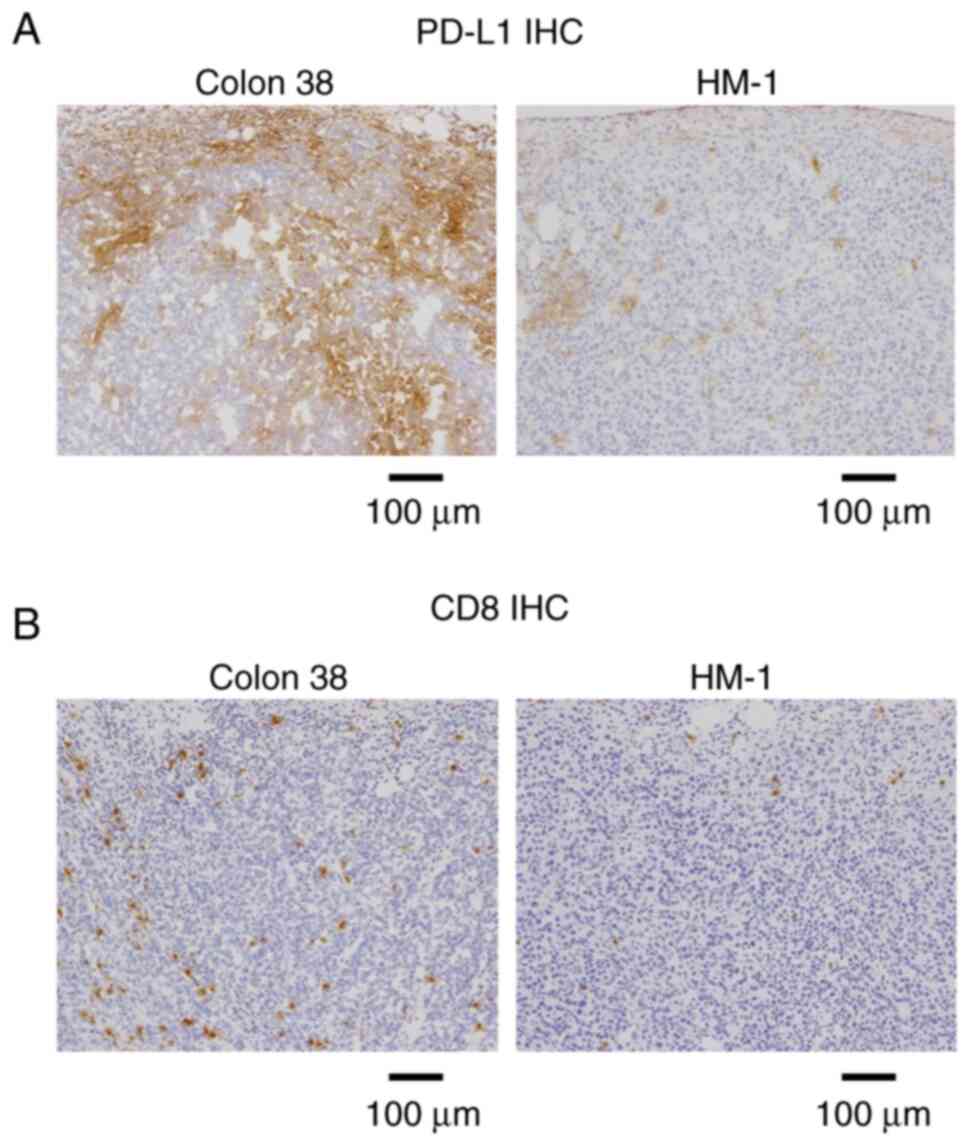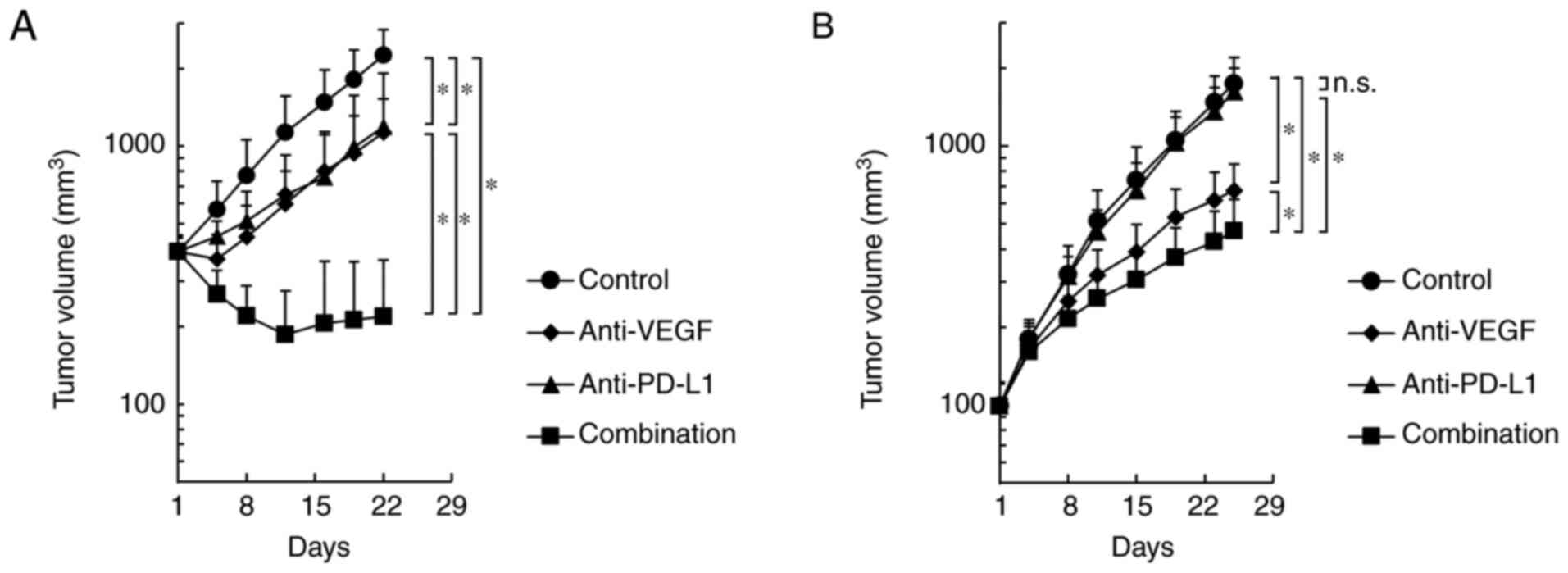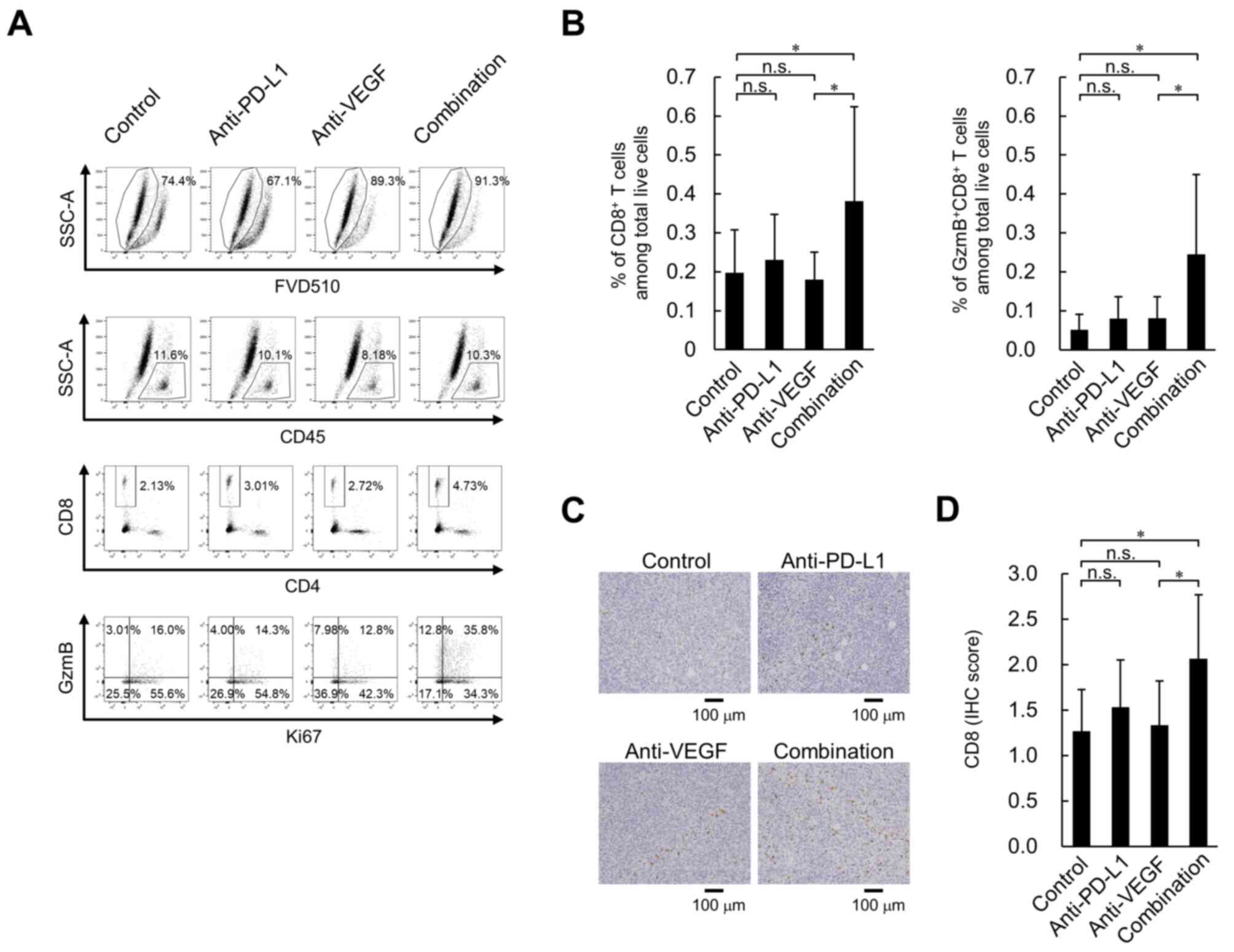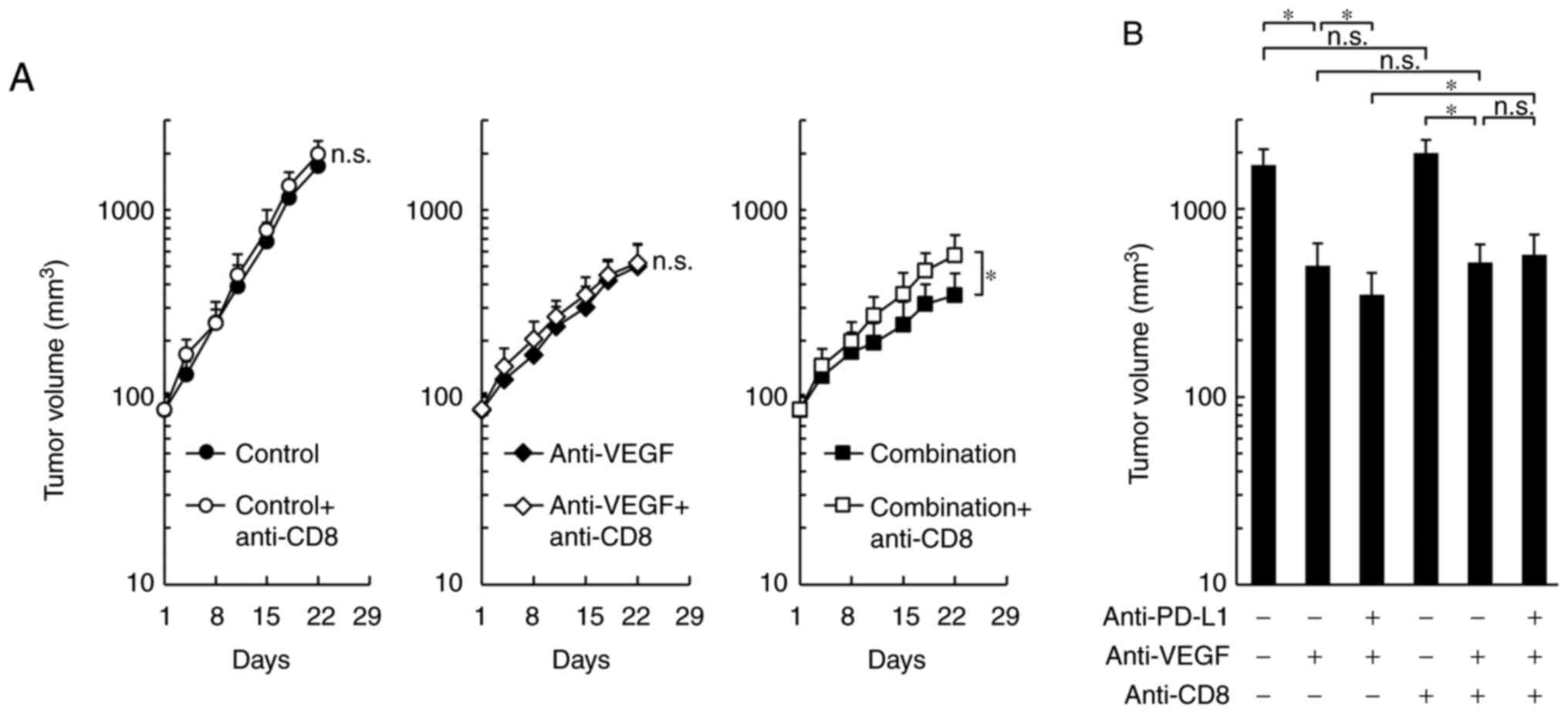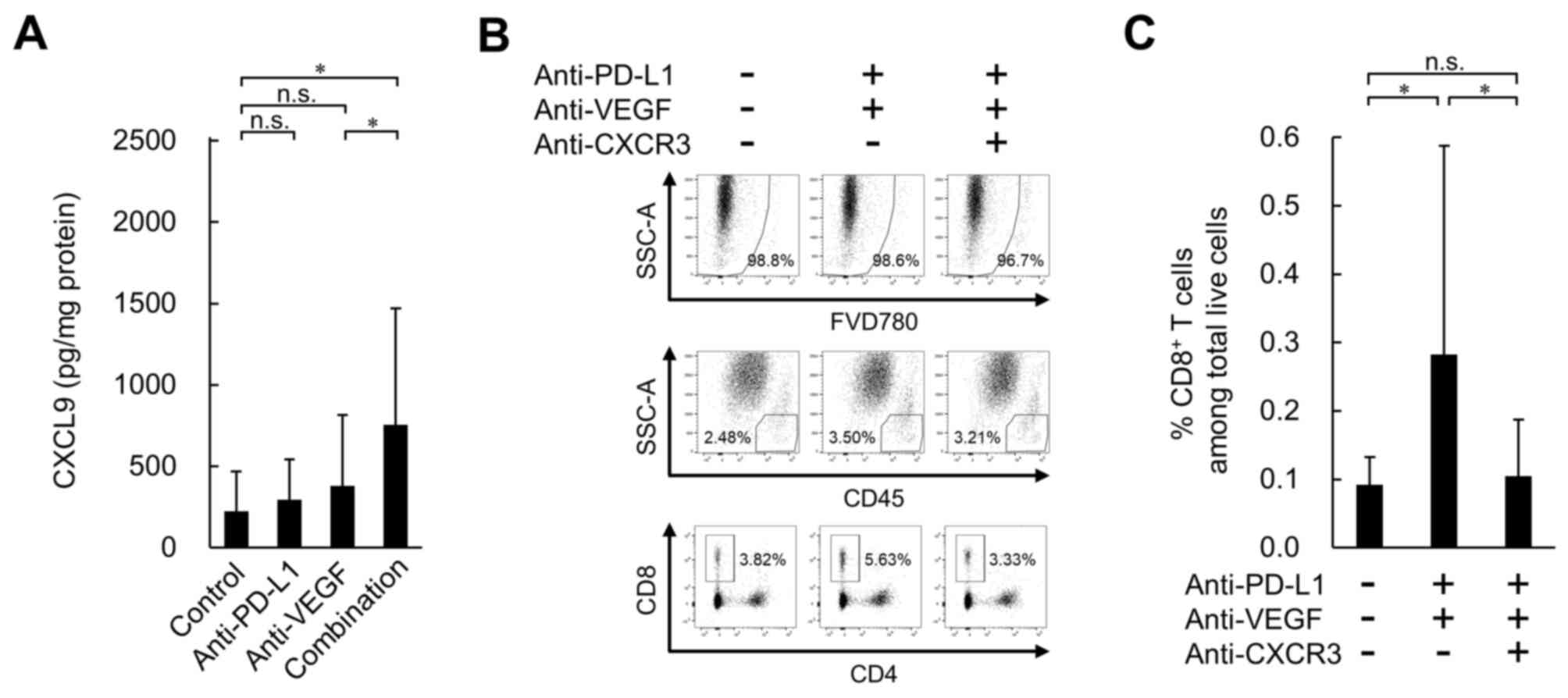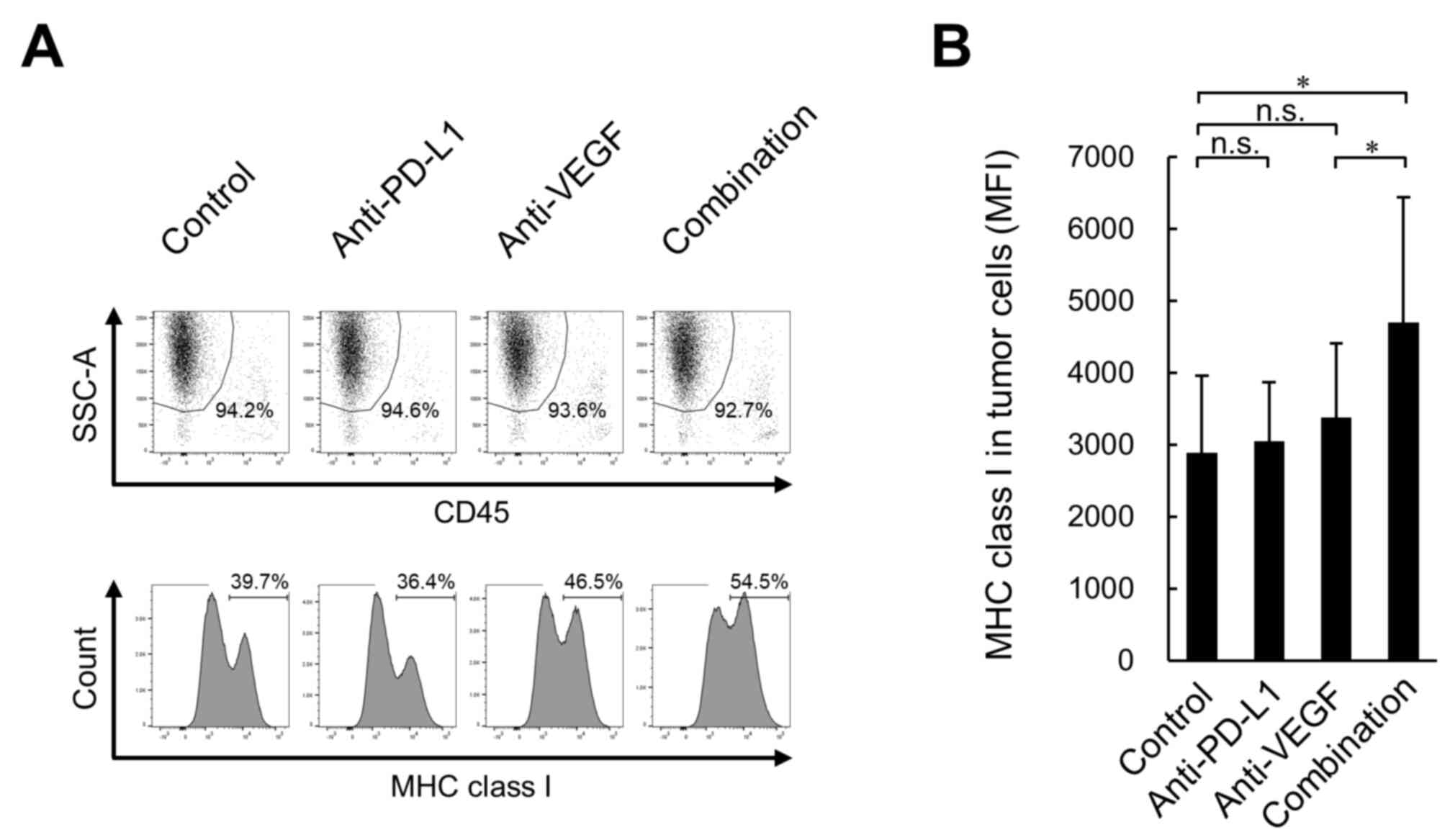|
1
|
Pardoll DM: The blockade of immune
checkpoints in cancer immunotherapy. Nat Rev Cancer. 12:252–264.
2012. View
Article : Google Scholar : PubMed/NCBI
|
|
2
|
Chen DS and Mellman I: Oncology meets
immunology: The cancer-immunity cycle. Immunity. 39:1–10. 2013.
View Article : Google Scholar : PubMed/NCBI
|
|
3
|
Rittmeyer A, Barlesi F, Waterkamp D, Park
K, Ciardiello F, von Pawel J, Gadgeel SM, Hida T, Kowalski DM, Dols
MC, et al: Atezolizumab versus docetaxel in patients with
previously treated non-small-cell lung cancer (OAK): A phase 3,
open-label, multicentre randomised controlled trial. Lancet.
389:255–265. 2017. View Article : Google Scholar : PubMed/NCBI
|
|
4
|
Chen DS and Mellman I: Elements of cancer
immunity and the cancer-immune set point. Nature. 541:321–330.
2017. View Article : Google Scholar : PubMed/NCBI
|
|
5
|
Socinski MA, Jotte RM, Cappuzzo F, Orlandi
F, Stroyakovskiy D, Nogami N, Rodríguez-Abreu D, Moro-Sibilot D,
Thomas CA, Barlesi F, et al: Atezolizumab for first-line treatment
of metastatic nonsquamous NSCLC. N Engl J Med. 378:2288–2301. 2018.
View Article : Google Scholar : PubMed/NCBI
|
|
6
|
West H, McCleod M, Hussein M, Morabito A,
Rittmeyer A, Conter HJ, Kopp HG, Daniel D, McCune S, Mekhail T, et
al: Atezolizumab in combination with carboplatin plus
nab-paclitaxel chemotherapy compared with chemotherapy alone as
first-line treatment for metastatic non-squamous non-small-cell
lung cancer (IMpower130): A multicentre, randomised, open-label,
phase 3 trial. Lancet Oncol. 20:924–937. 2019. View Article : Google Scholar : PubMed/NCBI
|
|
7
|
Gandhi L, Rodríguez-Abreu D, Gadgeel S,
Esteban E, Felip E, De Angelis F, Domine M, Clingan P, Hochmair MJ,
Powell SF, et al: Pembrolizumab plus chemotherapy in metastatic
non-small-cell lung cancer. N Engl J Med. 378:2078–2092. 2018.
View Article : Google Scholar : PubMed/NCBI
|
|
8
|
Hellmann MD, Paz-Ares L, Caro RB, Zurawski
B, Kim SW, Costa EC, Park K, Alexandru A, Lupinacci L, de la Mora
Jimenez E, et al: Nivolumab plus Ipilimumab in advanced
non-small-cell lung cancer. N Engl J Med. 381:2020–2031. 2019.
View Article : Google Scholar : PubMed/NCBI
|
|
9
|
Gabrilovich DI, Chen HL, Girgis KR,
Cunningham HT, Meny GM, Nadaf S, Kavanaugh D and Carbone DP:
Production of vascular endothelial growth factor by human tumors
inhibits the functional maturation of dendritic cells. Nat Med.
2:1096–1103. 1996. View Article : Google Scholar : PubMed/NCBI
|
|
10
|
Gabrilovich D, Ishida T, Oyama T, Ran S,
Kravtsov V, Nadaf S and Carbone DP: Vascular endothelial growth
factor inhibits the development of dendritic cells and dramatically
affects the differentiation of multiple hematopoietic lineages in
vivo. Blood. 92:4150–4166. 1998. View Article : Google Scholar : PubMed/NCBI
|
|
11
|
Oyama T, Ran S, Ishida T, Nadaf S, Kerr L,
Carbone DP and Gabrilovich DI: Vascular endothelial growth factor
affects dendritic cell maturation through the inhibition of nuclear
factor-kappa B activation in hemopoietic progenitor cells. J
Immunol. 160:1224–1232. 1998.PubMed/NCBI
|
|
12
|
Dikov MM, Ohm JE, Ray N, Tchekneva EE,
Burlison J, Moghanaki D, Nadaf S and Carbone DP: Differential roles
of vascular endothelial growth factor receptors 1 and 2 in
dendritic cell differentiation. J Immunol. 174:215–222. 2005.
View Article : Google Scholar : PubMed/NCBI
|
|
13
|
Horikawa N, Abiko K, Matsumura N,
Hamanishi J, Baba T, Yamaguchi K, Yoshioka Y, Koshiyama M and
Konishi I: Expression of vascular endothelial growth factor in
ovarian cancer inhibits tumor immunity through the accumulation of
myeloid-derived suppressor cells. Clin Cancer Res. 23:587–599.
2017. View Article : Google Scholar : PubMed/NCBI
|
|
14
|
Terme M, Pernot S, Marcheteau E, Sandoval
F, Benhamouda N, Colussi O, Dubreuil O, Carpentier AF, Tartour E
and Taieb J: VEGFA-VEGFR pathway blockade inhibits tumor-induced
regulatory T-cell proliferation in colorectal cancer. Cancer Res.
73:539–549. 2013. View Article : Google Scholar : PubMed/NCBI
|
|
15
|
Yi M, Jiao D, Qin S, Chu Q, Wu K and Li A:
Synergistic effect of immune checkpoint blockade and
anti-angiogenesis in cancer treatment. Mol Cancer. 18:602019.
View Article : Google Scholar : PubMed/NCBI
|
|
16
|
Finn RS, Qin S, Ikeda M, Galle PR, Ducreux
M, Kim TY, Kudo M, Breder V, Merle P, Kaseb AO, et al: Atezolizumab
plus bevacizumab in unresectable hepatocellular carcinoma. N Engl J
Med. 382:1894–1905. 2020. View Article : Google Scholar : PubMed/NCBI
|
|
17
|
Meder L, Schuldt P, Thelen M, Schmitt A,
Dietlein F, Klein S, Borchmann S, Wennhold K, Vlasic I, Oberbeck S,
et al: Combined VEGF and PD-L1 blockade displays synergistic
treatment effects in an autochthonous mouse model of small cell
lung cancer. Cancer Res. 78:4270–4281. 2018. View Article : Google Scholar : PubMed/NCBI
|
|
18
|
Zhang L, Chen Y, Li F, Bao L and Liu W:
Atezolizumab and bevacizumab attenuate cisplatin resistant ovarian
cancer cells progression synergistically via suppressing
epithelial-mesenchymal transition. Front Immunol. 10:8672019.
View Article : Google Scholar : PubMed/NCBI
|
|
19
|
Kato Y, Tabata K, Kimura T,
Yachie-Kinoshita A, Ozawa Y, Yamada K, Ito J, Tachino S, Hori Y,
Matsuki M, et al: Lenvatinib plus anti-PD-1 antibody combination
treatment activates CD8+ T cells through reduction of
tumor-associated macrophage and activation of the interferon
pathway. PLoS One. 14:e02125132019. View Article : Google Scholar : PubMed/NCBI
|
|
20
|
Hashimoto M, Niwa O, Nitta Y, Takeichi M
and Yokoro K: Unstable expression of E-cadherin adhesion molecules
in metastatic ovarian tumor cells. Jpn J Cancer Res. 80:459–463.
1989. View Article : Google Scholar : PubMed/NCBI
|
|
21
|
Oh SA, Wu DC, Cheung J, Navarro A, Xiong
H, Cubas R, Totpal K, Chiu H, Wu Y, Comps-Agrar L, et al: PD-L1
expression by dendritic cells is a key regulator of T-cell immunity
in cancer. Nat Cancer. 1:681–691. 2020. View Article : Google Scholar
|
|
22
|
Bagri A, Berry L, Gunter B, Singh M,
Kasman I, Damico LA, Xiang H, Schmidt M, Fuh G, Hollister B, et al:
Effects of anti-VEGF treatment duration on tumor growth, tumor
regrowth, and treatment efficacy. Clin Cancer Res. 16:3887–3900.
2010. View Article : Google Scholar : PubMed/NCBI
|
|
23
|
Liang WC, Wu X, Peale FV, Lee CV, Meng YG,
Gutierrez J, Fu L, Malik AK, Gerber HP, Ferrara N and Fuh G:
Cross-species vascular endothelial growth factor (VEGF)-blocking
antibodies completely inhibit the growth of human tumor xenografts
and measure the contribution of stromal VEGF. J Biol Chem.
281:951–961. 2006. View Article : Google Scholar : PubMed/NCBI
|
|
24
|
Ishikura N, Yorozu K, Kurasawa M,
Yanagisawa M, Sugimoto M and Yamamoto K: Sustained effect of
continuous treatment with bevacizumab following bevacizumab in
combination with chemotherapy in a human ovarian clear cell
carcinoma xenograft model. Oncol Rep. 42:1057–1065. 2019.PubMed/NCBI
|
|
25
|
Holm S: A simple sequentially rejective
multiple test procedure. Scand J Statist. 6:65–70. 1979.
|
|
26
|
Tannenbaum CS, Tubbs R, Armstrong D, Finke
JH, Bukowski RM and Hamilton TA: The CXC chemokines IP-10 and mig
are necessary for IL-12-mediated regression of the mouse RENCA
tumor. J Immunol. 161:927–932. 1998.PubMed/NCBI
|
|
27
|
Hickman HD, Reynoso GV, Ngudiankama BF,
Cush SS, Gibbs J, Bennink JR and Yewdell JW: CXCR3 chemokine
receptor enables local CD8(+) T cell migration for the destruction
of virus-infected cells. Immunity. 42:524–537. 2015. View Article : Google Scholar : PubMed/NCBI
|
|
28
|
Tokunaga R, Zhang W, Naseem M, Puccini A,
Berger MD, Soni S, McSkane M, Baba H and Lenz HJ: CXCL9, CXCL10,
CXCL11/CXCR3 axis for immune activation - A target for novel cancer
therapy. Cancer Treat Rev. 63:40–47. 2018. View Article : Google Scholar : PubMed/NCBI
|
|
29
|
Guirnalda P, Wood L, Goenka R, Crespo J
and Paterson Y: Interferon γ-induced intratumoral expression of
CXCL9 alters the local distribution of T cells following
immunotherapy with listeria monocytogenes. Oncoimmunology.
2:e257522013. View Article : Google Scholar : PubMed/NCBI
|
|
30
|
Gorbachev AV, Kobayashi H, Kudo D,
Tannenbaum CS, Finke JH, Shu S, Farber JM and Fairchild RL: CXC
chemokine ligand 9/monokine induced by IFN-gamma production by
tumor cells is critical for T cell-mediated suppression of
cutaneous tumors. J Immunol. 178:2278–2286. 2007. View Article : Google Scholar : PubMed/NCBI
|
|
31
|
Griffioen AW, Damen CA, Blijham GH and
Groenewegen G: Tumor angiogenesis is accompanied by a decreased
inflammatory response of tumor-associated endothelium. Blood.
88:667–673. 1996. View Article : Google Scholar : PubMed/NCBI
|
|
32
|
Motz GT, Santoro SP, Wang LP, Garrabrant
T, Lastra RR, Hagemann IS, Lal P, Feldman MD, Benencia F and Coukos
G: Tumor endothelium FasL establishes a selective immune barrier
promoting tolerance in tumors. Nat Med. 20:607–615. 2014.
View Article : Google Scholar : PubMed/NCBI
|
|
33
|
Khattak MA, Abed A, Reid AL, McEvoy AC,
Millward M, Ziman M and Gray ES: Role of serum vascular endothelial
growth factor (VEGF) as a potential biomarker of response to immune
checkpoint inhibitor therapy in advanced melanoma: Results of a
pilot study. Front Oncol. 10:10412020. View Article : Google Scholar : PubMed/NCBI
|
|
34
|
Iwai T, Sugimoto M, Patil NS, Bower D,
Suzuki M, Kato C, Yorozu K, Kurasawa M, Shames DS and Kondoh O:
Both T cell priming in lymph node and CXCR3-dependent migration are
the key events for predicting the response of atezolizumab. Sci
Rep. 11:139122021. View Article : Google Scholar : PubMed/NCBI
|
|
35
|
Herbst RS, Soria JC, Kowanetz M, Fine GD,
Hamid O, Gordon MS, Sosman JA, McDermott DF, Powderly JD, Gettinger
SN, et al: Predictive correlates of response to the anti-PD-L1
antibody MPDL3280A in cancer patients. Nature. 515:563–567. 2014.
View Article : Google Scholar : PubMed/NCBI
|
|
36
|
Bai M, Zheng Y, Liu H, Su B, Zhan Y and He
H: CXCR5+ CD8+ T cells potently infiltrate
pancreatic tumors and present high functionality. Exp Cell Res.
361:39–45. 2017. View Article : Google Scholar : PubMed/NCBI
|
|
37
|
Xing J, Zhang C, Yang X, Wang S, Wang Z,
Li X and Yu E: CXCR5+CD8+ T cells infiltrate
the colorectal tumors and nearby lymph nodes, and are associated
with enhanced IgG response in B cells. Exp Cell Res. 356:57–63.
2017.PubMed/NCBI
|
|
38
|
Castro F, Cardoso AP, Gonçalves RM, Serre
K and Oliveira MJ: Interferon-Gamma at the crossroads of tumor
immune surveillance or evasion. Front Immunol. 9:8472018.
View Article : Google Scholar : PubMed/NCBI
|
|
39
|
Roman J, Rangasamy T, Guo J, Sugunan S,
Meednu N, Packirisamy G, Shimoda LA, Golding A, Semenza G and
Georas SN: T-cell activation under hypoxic conditions enhances
IFN-gamma secretion. Am J Respir Cell Mol Biol. 42:123–128. 2010.
View Article : Google Scholar : PubMed/NCBI
|
|
40
|
De Almeida PE, Mak J, Hernandez G,
Jesudason R, Herault A, Javinal V, Borneo J, Kim JM and Walsh KB:
Anti-VEGF treatment enhances CD8+ T-cell antitumor
activity by amplifying hypoxia. Cancer Immunol Res. 8:8062020.
View Article : Google Scholar : PubMed/NCBI
|
|
41
|
Garrido F and Algarra I: MHC antigens and
tumor escape from immune surveillance. Adv Cancer Res. 83:117–158.
2001. View Article : Google Scholar : PubMed/NCBI
|
|
42
|
Rosa FM and Fellous M: Regulation of
HLA-DR gene by IFN-gamma. Transcriptional and post-transcriptional
control. J Immunol. 140:1660–1664. 1988.PubMed/NCBI
|















